
Thomas Mukambilwa
Managing Director of African Support and Project Centre Mukambilwa advocates for the improvement of Congolese lives in London through educational and health events

JJ Bola
Writer, Poet, Educator, Human. Author of No Place to Call Home. Spoken word poet turned author, Bola has read and spoken internationally at TedTalks and festivals.

Vava Tampa
Founder of Save the Congo; Activist and Rhumba lover. Tampa has been advocating for peace and justice in the Democratic Republic of Congo since 2008.
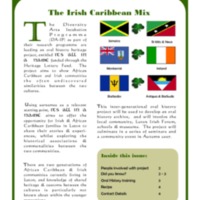
It's All in a Name
It's All in a Name was an oral history project led by the Diversity Arts Incubation Programme in Luton. A collaboration between the local community, Luton Irish Forum and local schools and museums, the project aimed to discover the historical associations, shared customs and heritage between African Caribbean and Irish communities in Luton, using surnames as a starting point (popular surnames shared by both communities include Murray, Nugent or Patrick). The project developed an oral history archive, and culminated in a series of seminars and a community event.
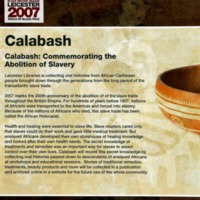
Calabash
Leicester Libraries collected oral histories from African Caribbean people brought down through the generations from the transatlantic slave trade. Health and healing were essential to slave life, and enslaved Africans developed their own healing knowledge. The Calabash project recorded this secret knowledge by collecting oral histories passed down to descendants of enslaved Africans at workshops and educational sessions.
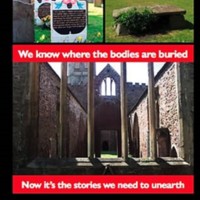
Diverse Stories
The Diverse Stories project began in 2007 with participants from Malcolm X Elders, an Afro Caribbean elders and community group in Bristol, taking part in a creative writing project to mark the bicentenary. This was jointly supported by Show of Strength Theatre Company, Our Stories Make Waves and English Heritage. Participants visited the ruined Temple Church in Bristol and explored its links with the slave trade and abolition movement. Their responses included a range of dramatic monologues covering themes such as slavery, racism, trade, childhood memories of Jamaica and migration from the Caribbean. These were read at a performance by a professional actor. In 2008 the project was given a permanent record by a selection of the stories being recorded on audio CD.
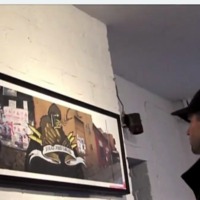
Freedom Song
Freedom Song involved young people from Derby, Leicester and Nottingham creating their own digital musical video shorts to express contemporary social and cultural experiences. The group in Derby looked to develop links to regional history and culture through the study of the songs of oppression and freedom of the slave trade and its musical legacies today. A heritage project involved participants researching music of their ancestors and predecessors in the cultural tradition, exploring the Windrush migrations, oral traditions and the impact of female artists on music cultures in the UK.
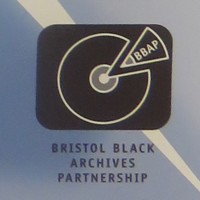
Bristol Black Archives Partnership
The Bristol Black Archives Partnership (BBAP) was set up to collect, protect and make available the heritage of Bristol's local black history. The partnership involved communities, heritage organisations and academic organisations coming together to collect and make accessible the archives - films, photographs, documents and objects - that reflected the experience and contribution of black people in Bristol. BBAP aimed to provide learning resources for a better understanding of Bristol's multicultural history: the 'Me, We, Making History' calendars celebrated local black achievers; 'My Legacy Journal' was made available for African-Caribbean people to record their own family identity, history and stories. A Black Bristolians Teaching Pack was produced, alongside a travelling exhibition based on the project's research entitled 'The Black Presence in Bristol - 16th Century to the Present Day'.
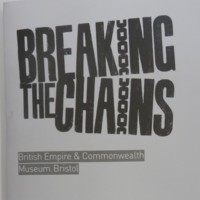
Breaking the Chains
Breaking the Chains opened at the British Empire and Commonwealth Museum to coincide with the bicentenary, and told the story of the British transatlantic slave trade and its abolition. Developed in partnership with Bristol City Council's Museums, Galleries and Archives' Service, the exhibition used artefacts, film and testimony to challenge perceptions about Britain's involvement in the slave trade and its legacy today. It featured a multimedia gallery of digital memories and feelings on the contemporary legacies of the slave trade; interactive sound stations to see and hear personal testimonies and the power of black music; and the ‘Me deya’ gallery, led by Firstborn Creatives, a collection of work from artists and communities who wished to share their creative pieces about the legacies of the slave trade. Associated events included African music for children, community dance events and public debates.
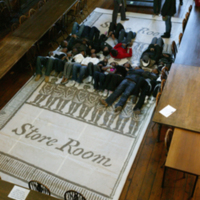
Changing Perspectives
Changing Perspectives was a community-based initiative based around the experiences of twenty-five African and Caribbean families from the North-East, to explore how their life in the UK contrasts with the lives of their ancestors. The project created a multimedia archive of cultural responses to celebrate the heritage of these families. This included oral testimonies, creative writing, photography, digital storytelling and art, emerging from a variety of community-led workshops. A series of workshops were held at Durham University Library, Archives and Special Collections (pictured), including a session aimed at children and young people, which focused on the experiences of children in the slave trade via extracts from the autobiography of Olaudah Equiano. Project outputs included a book, an interactive website, an exhibition of words and pictures of the community, an oral testimony collection, and series of documentary films. A key aim of the project was to promote community cohesion and develop cross cultural awareness and understanding.
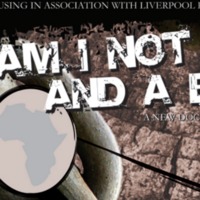
Am I Not a Man and a Brother?
Am I Not a Man and a Brother? was a piece of documentary theatre devised by Reveal Theatre Company in partnership with North Staffordshire Racial Equality Council. It used stories and testimony from the African Caribbean community in Stoke-on-Trent and North Staffordshire, interwoven with historical and contemporary slave stories. The play was produced by Robert Marsden and Julia Barton. The production was launched at the Stoke-on-Trent Racial Equality Council - where it was performed to the local people who had contributed their stories and was accompanied by a performance by a local Black choir - and then toured to venues in Bristol, London and Liverpool.